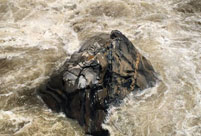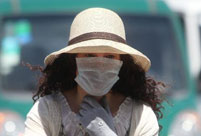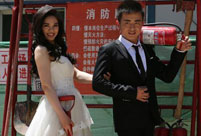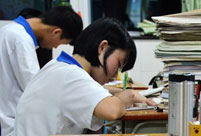 Luoyang aims to become 'Chinese Culture City'
Luoyang aims to become 'Chinese Culture City'
 Century-old jade disc found confirms ancient legend
Century-old jade disc found confirms ancient legend
 A serious mind behind Chinese leader
A serious mind behind Chinese leader
 Panda Cubs to Predict 2014 World Cup Winners
Panda Cubs to Predict 2014 World Cup Winners
 China Southern Airlines flight attendants win titles in service contest
China Southern Airlines flight attendants win titles in service contest
 Pupil's performance art persuades people to stop smoking
Pupil's performance art persuades people to stop smoking
 Nie Chenxi's clay tigers
Nie Chenxi's clay tigers
 Children's Day wishes
Children's Day wishes
 Chinese Kung Fu charms Silicon Valley
Chinese Kung Fu charms Silicon Valley
 Tranquil Yankou ancient town
Tranquil Yankou ancient town
Family members wave to students heading to take the gaokao in the city of Liu’an in Anhui province on Thursday. (Photo/China Daily)
"Students from the big cities study according to their own interests, and have flexible minds and a wide knowledge base. Our minds were rigid because we were tightly controlled at high school."
While many parents are obviously happy with the system, the teaching model has dissuaded some from sending their children to the school.
"I think the students there are fools and bookworms," one Hengshui city resident said. "After they graduate, they only work for other people and do not dare to start their own businesses. Their thoughts have been imprisoned," said the 35-year-old mother of two, who only gave her surname as Liu.
"I have thought it through and believe that other schools are more likely to guarantee a prosperous future for my children, she said.
'It's fabulous'
Not everyone is critical of the Hengshui High system, though. One freshman, who spoke on condition of anonymity, was effusive in his praise. "After entering the school I discovered that it's fabulous," said the boy, who hails from Baoding, 160 kilometers from Hengshui.
"It's not at all how outsiders describe it. It's not a demon school. Not hell, not purgatory," the 15-year-old said. "There is no rote learning. In fact, students at other schools do that. Some parents say many of the students are just bookworms, but it's not true. Even if you're a bookworm when you arrive, you'll soon change. Choosing to study here was absolutely the right decision," he said, adding that the school offers a variety of activities and clubs - he has joined three - and students are also given the opportunity to take part in national and international competitions, such as UN-style debates, basketball, table tennis and other sports.
The school authorities declined a request for an interview, stating that the gaokao is a "sensitive time", and, "Any report, no matter whether it's positive or negative, will bring the school into new controversy".
Despite this, one teacher agreed to talk, but he declined to be named. "There's been a lot of criticism that we imprison the students, but that's not true - we certainly don't imprison their minds. The teachers only give lessons in half of the classes, and the rest of the time is for the students so they have time to think for themselves and improve themselves," he said.
"Although it's a boarding school, we guarantee access to outside information. Every year, we spend 400,000 yuan ($64,000) on the latest books. Every evening, the students can watch news broadcasts for 20 minutes, even during the gaokao period."
He said discipline is strict and the timetable regimented for good reason: "We have more than 5,000 students on campus. If every student followed their own inclination, what would happen to the school?"
Although the school declined our interview request, we were allowed to visit the campus. As he showed us around an exhibition about science and technology Nobel laureates, the teacher explained that the school is attempting to "plant a seed of interest in science and technology in the students' hearts".
He said the room, which contained 75 desktop computers, is open to students throughout the day. "They can come and search for any information they need at any time during class breaks or meal times," he said. "If our students are interested in a topic that's not covered by the textbooks, we offer them the opportunity to study it," he said, as we walked around a stadium where groups of students were playing table tennis and basketball.
"Six of our students were admitted by universities in Singapore - that's 25 percent of their intake from Hebei. So, if the school is an 'exam factory', does it follow that Singapore is also an exam factory?" he asked.
Some may consider the school's methods controversial, but it has played host to more than 170,000 visitors, mostly teachers and education professionals, in the past 10 years.
Xu Nan, a math teacher at Xingtan High School in Guangdong province, visited late last year. "We visited hoping to learn something that would help improve the quality of teaching in our school," Xu wrote in an e-mail exchange with China Daily. Although the authorities at Xu's school have attempted to put what they learned into practice, so far there has been no marked improvement in results.
 |  |
 Magnificent Hutiao Gorge
Magnificent Hutiao Gorge  Heat waves hit China
Heat waves hit China Love at the construction site
Love at the construction site Graduation photos bring memories back to life
Graduation photos bring memories back to life Art school students present works in Nanjing
Art school students present works in Nanjing Xinjiang's first high-speed railway goes on trial run
Xinjiang's first high-speed railway goes on trial run 3D Sea-life Themed Art Garage unveiled in Zhengzhou
3D Sea-life Themed Art Garage unveiled in Zhengzhou
 Creative Photos go viral during graduation season
Creative Photos go viral during graduation season Students in last-minute effort for Gaokao
Students in last-minute effort for Gaokao Dali, an ideal summer vacation destination
Dali, an ideal summer vacation destination Xichan Temple's little monk hit the Internet
Xichan Temple's little monk hit the Internet Monologue of a modern dancer
Monologue of a modern dancer College girl proposes to boyfriend on Weibo
College girl proposes to boyfriend on Weibo Special operation members in counter-terrorism training
Special operation members in counter-terrorism training American football brings manhood out of boys
American football brings manhood out of boysDay|Week|Month